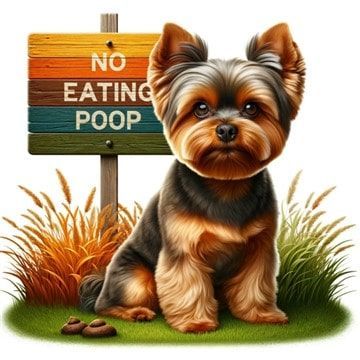My Yorkie Eats Feces: Solving the Issue of Coprophagia
Overview

Please note: YorkieInfoCenter is reader-supported, and some of the product suggestions on this page are affiliate links. As an Amazon Associate we earn from qualifying purchases. This is at no extra cost to you and helps us continue providing free, high-quality information.
What is Coprophagia?
Statistics: How Common is it for a Yorkie to Eat Feces?
In September 2017, we launched an online inquiry focusing on the behavior, health, and temperament of Yorkshire Terriers. This survey invited members of the YorkieInfoCenter site to respond to a variety of multiple-choice questions, with an option to leave comments for more detailed insights on specific topics.
After a period of 7 days, we compiled responses from 2,146 participants. The demographic spread of respondents included 72% from the US, 8% from the UK, 8% from Canada, and the rest from a range of other countries.
The distribution of respondents by gender was 56% male and 44% female.
The age breakdown of the Yorkshire Terriers discussed was as follows: 3% were very young puppies (under 6 months old), 10% were older puppies (6 to 12 months old), 51% were young adults (1 to 3 years old), 26% were adults (4 to 8 years old), and 10% were seniors (9 years old and above).
The survey also explored behavioral challenges faced by Yorkie owners. In one section, we inquired, "What are the biggest challenges you've encountered with your Yorkie?" It was specified that health issues should not be included in these responses. Participants had the freedom to select all issues that applied to them, with an 'Other' option and a comment section provided for additional details.
Interestingly, coprophagia (the consumption of feces) did not emerge as a primary concern, unlike separation anxiety (18%), excessive barking (16%), and disobedience (7%). Instead, it was listed among the top three concerns categorized under 'Other' at 4%, alongside problems with territorial marking and behaviors indicating shyness, clinginess, or nervousness.
Reasons Why a Yorkie May Be Eating Feces
Canine coprophagia, or the act of a dog eating feces, is a perplexing behavior with many possible causes, broadly categorized into nutritional, behavioral, and medical reasons. Understanding these triggers can help address the problem and resolve the behavior. Let's look at the top causes.
Nutritional Causes:
Low-Quality Diet and Fillers: Yorkshire Terriers consuming low-quality diets deficient in essential proteins, vitamins, and minerals may turn to eating feces to instinctively supplement missing nutrients. Such diets often include fillers like corn meal or bone meal, which bulk up food volume but offer little nutritional value, leading to nutritional deficiencies. This lack of vital nutrients can prompt dogs to seek alternative nutrition sources, resulting in coprophagia as a misguided effort to fulfill their dietary needs.
Behavioral Causes:
- Attention-Seeking: Dogs may notice that eating poop garners a strong reaction from their owners and continue the behavior to get attention, even if it's negative.
- Boredom: Dogs experiencing a lack of mental and physical stimulation, especially when left alone for extended periods, may engage in feces inspection and ingestion as a novel form of entertainment or exploration.
- Cleanliness: In some instances, dogs may eat feces to clean their living space, especially if they're confined to small areas for long periods.
- Exploration: Puppies, especially, may explore and taste everything as part of their learning process, which can include their own feces.
- Instinctual Behavior: In some cases, dams will eat the feces of their puppies to keep the den clean. This behavior might be mimicked by puppies, though it usually fades as they grow older.
- Stress and Separation Anxiety: Yorkshire Terriers, known for their strong emotional bonds with their owners, can be particularly susceptible to stress and separation anxiety. This anxiety can manifest when they are left alone, leading to behaviors including coprophagia
Health Causes:
Underlying Health Issues: Coprophagia in dogs can signal underlying health issues but is often accompanied by more obvious signs of illness. Conditions like anemia, diabetes, inflammatory bowel disease, intestinal parasites, and thyroid disease may lead dogs to seek out feces due to nutrient deficiencies or increased appetite. However, for healthy Yorkshire Terriers, coprophagia typically stems from the aforementioned dietary inadequacies or behavioral factors.
Can a Yorkie Get Sick from Eating Feces?
Yorkies can indeed get sick from eating feces, whether their own or from other animals, posing several health risks.
Health Concerns if Eating Their Own Poop:
- Digestive Issues: While feces from a diet of low-quality food might contain undigested food, consuming it is harmful and can lead to gastrointestinal upset, including stomach pain and vomiting. Persistent coprophagia may cause long-term issues like malnutrition, weakened immune response, poor skin and coat health, dental problems, and gastrointestinal disturbances.
- Parasite Re-infection: Yorkies being treated for worms can re-infect themselves by eating feces containing worms or eggs. Most puppies are born with parasites like roundworms, often immune to deworming medications due to dormant stages in the mother's tissues. Regular deworming is essential, especially for puppies with coprophagia, to break the cycle of re-infection.
Health Concerns if Eating Poop from Other Dogs:
This poses significant risks, as feces can harbor parasites and diseases that are transmissible to Yorkies. Major concerns include:
- Parasites: Roundworms, whipworms, tapeworms, and hookworms.
- Diseases: Including but not limited to campylobacteriosis, corona, cryptosporidiosis, giardiasis, parvovirus, and salmonellosis.
Health Concerns if Eating Cat Poop:
- Parasites: Dogs can become infected with various types of worms, such as roundworms and tapeworms, which can cause a range of health issues, from digestive disturbances to more severe conditions if left untreated.
- Diseases: This includes clostridia, salmonella and campylobacter.
Exactly How to Stop a Yorkie from Eating Feces
Stopping a Yorkie from eating feces, a behavior known as coprophagia, requires a multifaceted approach. Here are four key strategies to address this issue effectively:
#1: Ensure High-Quality Diet
Feeding your Yorkie high-quality food is crucial. Low-grade foods, often found in supermarkets, lack essential nutrients and may lead to coprophagia. Factors leading to the choice of such foods include convenience, brand recognition, and budget constraints. However, investing in a better diet can have numerous health benefits beyond preventing coprophagia, including reducing allergy risks and improving overall health.
What to Do:
- Avoid low-quality foods known for fillers and minimal nutritional value. Brands to steer clear of include Beneful, Everpet, Gravy Train, and others rated 1 to 3 stars.
- Choose top-rated foods like Merrick or Wellness, which are known for their nutritional completeness and lack of harmful additives. One that we like a lot is Merrick Lil Plates Premium Grain Free Salmon and Sweet Potato, which is 100% all natural, has wholesome ingredients including salmon, whitefish, sweet potatoes, peas, flaxseed, apples and blueberries. This also has lots of omega-3 to promote skin health, probiotics for good digestion and gut health, and has no artificial additives or fillers.
- Select healthy treats, preferring natural options like fruits (blueberries, raspberries) and veggies (carrots, peas), and ensuring any manufactured treats are free of additives and made in the USA. One that we like is Bocce's Bakery Oven Baked Say Moo Treats, which is a very limited ingredient, all-natural snack that's made in the USA and sized well for small dogs like the Yorkie.
#2: Limit Access to Feces
This is a fairly straightforward tip that isn't followed often enough. But, it just takes a bit of work and getting used to a new routine. Steps include:
- Supervising outdoor time to prevent unsupervised eating of feces, ingestion of harmful substances, or escape attempts. Regularly clean your yard to remove feces.
- Leashing and harnessing your Yorkie during walks to keep them away from feces, using the 'leave it' command to avoid ingestion.
- Immediate Cleanup: Prompt removal of feces from the environment, both indoors and outdoors, can significantly reduce the opportunity for coprophagia.
- For cat owners, place litter boxes out of reach to prevent your Yorkie from accessing cat feces.
#3: Modify Behavior your Reactions
Be aware of your reaction if your Yorkie grabs feces:
- Do not chase them, as it may seem like a game. Instead, entice them to come to you.
- Stay calm during clean-up to avoid making feces seem interesting or valuable.
#4: Use Safe Supplements or Additives
Avoid harmful solutions like hot sauce or products with MSG, which can cause health issues. Consider more effective options including:
- Pineapple or Pumpkin: These are natural choices that may aid digestion and deter coprophagia.
- Probiotics and Digestive Enzymes: Some supplements can make feces less appealing and/or help with digestion. One to consider is No Poo Chews for Dogs by VetPromise. This has bromelain and pumpkin to promote health digestion, as well as digestive enzymes and probiotics. These are very small, but are for dogs of all sizes; you may need to cut these in half to offer the proper dose to your Yorkie.
#5: Environmental and Behavioral Strategies
To effectively prevent and address coprophagia in Yorkies, integrating environmental enrichment with strategic behavioral training offers a holistic approach. This strategy involves:
- Enhanced Physical Activity: Incorporate regular, stimulating walks and play sessions to burn off excess energy and minimize boredom, both of which can contribute to feces eating.
- Mental Engagement: Use puzzle toys, engage in training exercises, and introduce interactive toys or games that mentally challenge your Yorkie, keeping them mentally stimulated and less likely to resort to undesirable behaviors like coprophagia. One that we like is the Snuffle Mat for Dogs by Oliumt which gives a Yorkie a fun task that's self-rewarding; this can be set up any time a Yorkie could use some entertainment, including when you're about to leave for a while.
- Skillful Command Training: Teach and consistently reinforce commands beyond the basic "leave it," such as "come" and "drop it." These commands can be crucial in preventing your Yorkie from engaging in coprophagia by offering direct control over the situation.
- Positive Reinforcement Techniques: Always reward your Yorkie for complying with commands or for naturally avoiding feces, using treats, praise, or both. This reinforces good behavior and establishes a clear preference for the desired actions over eating feces.
A Final Note:
Addressing coprophagia in Yorkies requires a blend of patience, understanding, and a comprehensive approach tailored to your little guy or gal's unique needs. By combining high-quality nutrition, environmental enrichment, behavioral training, and attentive healthcare, you can significantly reduce or eliminate this challenging behavior.
Remember, the goal is not only to stop the immediate behavior but also to ensure your Yorkie leads a healthy, happy, and fulfilled life. Regular exercise and mental stimulation are as crucial as a nutritious diet free from harmful fillers. Likewise, positive reinforcement and consistent command training reinforce good behavior, making your Yorkie more resilient to stress and boredom that may trigger coprophagia.
Are you a site member yet?
More helpful articles:
Yorkshire Terrier At-home Dental Care - Prioritizing dental care is crucial for Yorkshire Terriers, a breed that is prone to tooth decay. Learn active teeth cleaning strategies to prevent infections and tooth loss.
How to Help a Yorkshire Terrier Live a Long Life - Implement easy, impactful steps today to positively influence your Yorkie's longevity, seamlessly integrating into their care routine.
Yorkshire Terrier Do and Don't List - A super-helpful concise guide on the most important do's and the most vital don'ts for this amazing toy breed. How many are you following?
